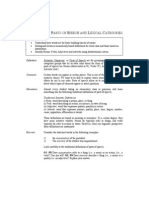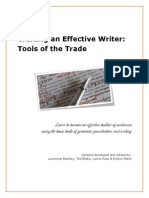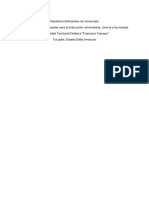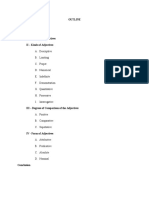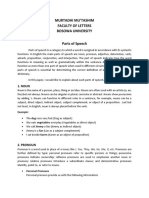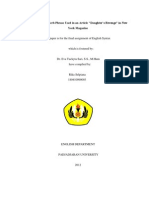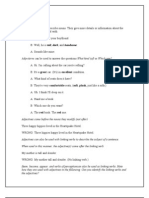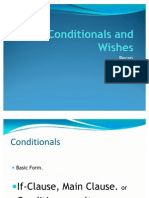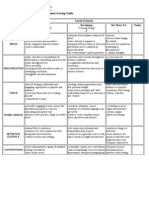Checking Parts of Speech
Checking Parts of Speech
Uploaded by
Sam SaqibCopyright:
Available Formats
Checking Parts of Speech
Checking Parts of Speech
Uploaded by
Sam SaqibCopyright
Available Formats
Share this document
Did you find this document useful?
Is this content inappropriate?
Copyright:
Available Formats
Checking Parts of Speech
Checking Parts of Speech
Uploaded by
Sam SaqibCopyright:
Available Formats
Linguistics 20 Introduction to Linguistics
B. Hayes UCLA
Checking Parts of Speech
When you parse sentences or do inflectional morphology, one of the first tasks is to assign every word or stem to an appropriate part of speech. There are two ways to check, one for finding Nouns, Verbs, and Adjectives, and the other for remaining categories. 1. Nouns, Verbs, Adjectives These are so-called open-class categories, meaning that the language readily accepts new ones (in borrowings, slang, advertising, etc.). They each have thousands of members. The ways to diagnose these parts of speech are as follows. 1.1 Semantics A very rough way of getting part of speech is the traditional one based on meaning. a noun designates a thing1: boy, sincerity, soup, method a verb designates an action: jump, think, exist, elapse an adjective designates a quality: green, sincere, former This method is tricky, since there are nouns that, at least in one sense, designate actions, such as announcement, portrayal, and so on. 1.2 Diagnostic frames The other method is to use diagnostic frames; that is, particular contexts that only permit a verb, or noun, or adjective, to occur. Anything that can occur in the frame I admire the ___. (like truth, furniture, soup) is a noun. Anything that can occur in the frame She decided to ___. (like leave, cogitate, elapse2), is a verb. Anything that can occur in the frame:
1 2
Traditionally, person, place, or thing, but of course people and places are things The sentence may be nonsensical; the important part is whether it is grammatical.
Linguistics 20 Handout
Identifying Parts of Speech
p. 2
the one ___ thing (like important, green, inanimate) is an adjective. Once youve experimented with these frames, you can probably think up many others. 2. Other parts of speech The nice aspect of the other parts of speech is that they are closed-class words. This means, first, that there arent all that many of them. More important, they constitute a complete list, which cannot be added to (except by the long-term process of grammar change). So, if all else fails, you could just memorize these words. The method of diagnostic frames is also applicable in some cases. Note that the following is not a general list, but only the function words that would be used in the mini-grammar used in this course. Articles a, the, this, that, these, those, which, what These always begin a Noun Phrase, as in a book, that long article, what news. A diagnostic you can use is that no Noun Phrase can have more than one article. So, *the this book shows that this is an Article. Auxiliary verbs be (am, was, are, were, is), have (has, had),3 can, could, will, would, shall, should, may, might4 Diagnostic: only Auxiliary verbs may appear before the subject in a question: Will you eat the ice cream? vs. *Ate you the ice cream? Prepositions of, to, for, from, in, on, about, above, below, over, under, around, between, against, before, after, up, down Together with a following Noun Phrase, these form Prepositional Phrases (of the book, against reason, before the mast).
3 4
be and have can also be verbs, as in He will be here, She might have measles.
Older English had dare and durst: What immortal hand or eye / Dare frame thy fearful symmetry (William Blake, The Tiger, 1794).
Linguistics 20 Handout
Identifying Parts of Speech
p. 3
Complementizers5 that, if, whether These introduce subordinate clauses (sentences inside sentences). Examples: She said that she was going, I wonder if you are going, I wonder whether you are going. Pronouns Nominative I you he she it we they Objective6 me you him her it us them Genitive my your his her its our their
this, that, these, those, who, what Pronouns can occur alone as Noun Phrases, generally dont take modifiers, and stand for something else identifiable from the context.
5 6
Also: for, in constructions like I would prefer for you to win.
Objective is a case which combines the functions of Accusative and Dative. English makes no distinction between Accusative and Dative, so it is sensible to use the term Objective.
You might also like
- An Introduction To LanguageDocument23 pagesAn Introduction To LanguageNazrin Hanif50% (2)
- English Grammar All You Need To KnowDocument22 pagesEnglish Grammar All You Need To KnowDavid Fueter0% (1)
- Linguistics 101: An Introduction To The Study of LanguageDocument25 pagesLinguistics 101: An Introduction To The Study of LanguagecoriactrNo ratings yet
- What Is LinguisticsDocument9 pagesWhat Is LinguisticsEdificator BroNo ratings yet
- A Review of Grammar and SentencesDocument29 pagesA Review of Grammar and SentencesDonavan Tadia CabantacNo ratings yet
- Linguistics 101Document14 pagesLinguistics 101Elyasar AcupanNo ratings yet
- I. O. Macari, Morpho-Syntax, Lecture 8 5. Word ClassesDocument8 pagesI. O. Macari, Morpho-Syntax, Lecture 8 5. Word ClassesAlexandra CîșlariuNo ratings yet
- English Grammar Workbook Parts of Speech Volume 1Document16 pagesEnglish Grammar Workbook Parts of Speech Volume 1Arlene DiabordoNo ratings yet
- Speech and Language ProcessingDocument26 pagesSpeech and Language Processingseogmin chunNo ratings yet
- Best Parts of SpeechDocument30 pagesBest Parts of SpeechZabi MansooriNo ratings yet
- Part of Speech Overview: 1. NounDocument39 pagesPart of Speech Overview: 1. NounClarissa KurniadiNo ratings yet
- Lesson 2 Parts of SpeechDocument8 pagesLesson 2 Parts of Speechkuranji ruriNo ratings yet
- Verbs II Multi-Word Lexical Verbs 1 Multi-Word Verbs: Structure and MeaningDocument12 pagesVerbs II Multi-Word Lexical Verbs 1 Multi-Word Verbs: Structure and MeaningAdelina-Gabriela AgrigoroaeiNo ratings yet
- Parts of SpeechDocument8 pagesParts of SpeechPilar AuserónNo ratings yet
- Linguistics 1Document29 pagesLinguistics 1Hakkuo AmeNo ratings yet
- The Eight Parts of Speech: NounsDocument17 pagesThe Eight Parts of Speech: NounsValensia SumampouwNo ratings yet
- Crafting An Effective WriterDocument90 pagesCrafting An Effective WriterMartyn HughesNo ratings yet
- Parts of SpeechDocument4 pagesParts of SpeechDavid Alberto VillaltaNo ratings yet
- McDaniel Smith CairnesDocument22 pagesMcDaniel Smith CairnesNenad PaunovićNo ratings yet
- I. O. Macari, Morpho-Syntax, Lecture 8 5. Word ClassesDocument20 pagesI. O. Macari, Morpho-Syntax, Lecture 8 5. Word ClassesVlad CocuzNo ratings yet
- Part of Speech OverviewDocument5 pagesPart of Speech OverviewJayana SujayanoNo ratings yet
- Part of LinguisticsDocument37 pagesPart of LinguisticsNorlina CipudanNo ratings yet
- ENG 509 Descriptive Notes Lesson 1 To 15Document50 pagesENG 509 Descriptive Notes Lesson 1 To 15anwar67576821No ratings yet
- GrammatikaDocument10 pagesGrammatikaKateryna DidenkoNo ratings yet
- Grammar Cheat Sheet To Use With BellworkDocument8 pagesGrammar Cheat Sheet To Use With Bellworksaed ahmad100% (1)
- IELTS GRAMMAR (From Basic To Types)Document18 pagesIELTS GRAMMAR (From Basic To Types)Builoan1986No ratings yet
- General English Supplemental Lecture Handout For ENGLISH PROFICIENY TESTDocument23 pagesGeneral English Supplemental Lecture Handout For ENGLISH PROFICIENY TESTCath CordovaNo ratings yet
- Trabajo InglésDocument8 pagesTrabajo InglésGraciela GonzalezNo ratings yet
- Object of PrepositionsDocument9 pagesObject of PrepositionsBamsey BerrakNo ratings yet
- Determiners Reviewed 2Document4 pagesDeterminers Reviewed 2xxtwumasiNo ratings yet
- 7 Days to Grammar Excellence: How to Master English from Beginner to AdvancedFrom Everand7 Days to Grammar Excellence: How to Master English from Beginner to AdvancedNo ratings yet
- TKT Lexis 9Document4 pagesTKT Lexis 9Lorenny GuerreroNo ratings yet
- Lectures 7, 8 - Word Classes + ExercisesDocument28 pagesLectures 7, 8 - Word Classes + ExercisestbericaNo ratings yet
- Syntax: AssemblerDocument13 pagesSyntax: AssemblerShofa AmatillahNo ratings yet
- Lesson 2 The Expressive Macroskills SpeakingDocument10 pagesLesson 2 The Expressive Macroskills SpeakingBellan Joyce KanehNo ratings yet
- Presentasi PRONOUNSDocument15 pagesPresentasi PRONOUNSImam YudhoNo ratings yet
- English Morphology ExercisesDocument14 pagesEnglish Morphology ExercisesStef Gabriela100% (1)
- Part of Speech OverviewDocument5 pagesPart of Speech OverviewAsad MehmoodNo ratings yet
- MIT24 900F12 MorphologyDocument6 pagesMIT24 900F12 MorphologyDexterNo ratings yet
- Sub-Vd Agr PDFDocument21 pagesSub-Vd Agr PDFNotaly Mae Paja BadtingNo ratings yet
- Outline Body I - Meaning of Adjectives II - Kinds of AdjectivesDocument9 pagesOutline Body I - Meaning of Adjectives II - Kinds of AdjectivesJoelmar MondonedoNo ratings yet
- Sunday Class 1Document11 pagesSunday Class 1gerald suazoNo ratings yet
- General Education-English-EDITEDDocument282 pagesGeneral Education-English-EDITEDjerickNo ratings yet
- Crafting An Effective Writer - Tools of The TradeDocument90 pagesCrafting An Effective Writer - Tools of The TradeGafanhoto77No ratings yet
- Lesson-1 Vocabulary DevelopmentDocument35 pagesLesson-1 Vocabulary DevelopmentAreeba MuneerNo ratings yet
- Parts of Speech in EnglishDocument23 pagesParts of Speech in EnglishNina fauziah100% (2)
- English Communication and CompositionDocument6 pagesEnglish Communication and CompositionRocky100% (1)
- PronounsDocument8 pagesPronounsKelly ClaroNo ratings yet
- EnglishDocument95 pagesEnglishambujsinghbaghel786No ratings yet
- PTE Reading Grammar TipsDocument6 pagesPTE Reading Grammar TipsRanga Wanigasuriya100% (1)
- PARTS OF SPEECH UpdatedDocument12 pagesPARTS OF SPEECH UpdatedMCC Gilgit-BaltistanNo ratings yet
- Parts of Speech by TadhiDocument8 pagesParts of Speech by TadhiMurtadhi Mu'tashimNo ratings yet
- Grammar GNS 101 - 045314Document23 pagesGrammar GNS 101 - 045314Juicy LipsNo ratings yet
- Primary VerbsDocument19 pagesPrimary Verbsmohh7642No ratings yet
- GrammarDocument71 pagesGrammarAnonymous rQfQJrZRNo ratings yet
- Chapter 4Document28 pagesChapter 4Nga phạmNo ratings yet
- The Significant. The Significant.: Result ResultsDocument6 pagesThe Significant. The Significant.: Result ResultsGem Kristine Ventura SalazarNo ratings yet
- Mini Research SyntaxDocument28 pagesMini Research SyntaxRika Selpiana100% (2)
- Guide - Words, Phrases, Clauses and SentencesDocument14 pagesGuide - Words, Phrases, Clauses and SentencesTomas G Salazar TNo ratings yet
- Absolute Beginner Korean Season 1 L 4Document7 pagesAbsolute Beginner Korean Season 1 L 4Javon KeodouangdyNo ratings yet
- Lesson Plan Present PerfectDocument3 pagesLesson Plan Present Perfectped_inglesNo ratings yet
- Simple Present, Past Perfect & Comparisons QuizDocument28 pagesSimple Present, Past Perfect & Comparisons QuizandrewskyNo ratings yet
- Bowen Philippa Delaney Denis Got It Starter WorkbookDocument51 pagesBowen Philippa Delaney Denis Got It Starter WorkbookElizabeth Urbina100% (2)
- A Grammar of The Telugu Language PDFDocument409 pagesA Grammar of The Telugu Language PDFananthakrishna67% (6)
- Modul 3 d4 KepDocument25 pagesModul 3 d4 KepRizki RogersNo ratings yet
- GrammarDocument45 pagesGrammaribelievemeNo ratings yet
- Could Have, Should Have, Would HaveDocument3 pagesCould Have, Should Have, Would HaveAtento a cherchaNo ratings yet
- Present Perfect Simple/present Perfect Progressive/modal VerbsDocument24 pagesPresent Perfect Simple/present Perfect Progressive/modal VerbsCindy Lizeth Valle SalasNo ratings yet
- English Word StressDocument11 pagesEnglish Word StresssubtoNo ratings yet
- 5CQBT05 Dang Thao Phi Vietnamese and English Verb PhrasesDocument17 pages5CQBT05 Dang Thao Phi Vietnamese and English Verb PhrasesBenjamin FranklinNo ratings yet
- Conditionals WishesDocument28 pagesConditionals WishesGaby López MezaNo ratings yet
- Evres Common Irregular VerbsDocument3 pagesEvres Common Irregular VerbsCristina DanNo ratings yet
- My Routine - Production EdW1 - Week 3Document6 pagesMy Routine - Production EdW1 - Week 3JulietNo ratings yet
- EnEnEn DDocument98 pagesEnEnEn Dhashamraza74No ratings yet
- Personal Pro No MenDocument3 pagesPersonal Pro No MenMirjana StefanovskiNo ratings yet
- Writing RubricDocument1 pageWriting RubricNapoleon MontanoNo ratings yet
- Simple Past TenseDocument7 pagesSimple Past Tensehabieb_chalovaNo ratings yet
- BSL Proficiency TestDocument6 pagesBSL Proficiency TestRahul MahashabdeNo ratings yet
- SHS LP FinalDocument4 pagesSHS LP FinalDaisy Viola50% (2)
- Beginner S1 #3 Checking in To The Swedish Hotel: Lesson NotesDocument6 pagesBeginner S1 #3 Checking in To The Swedish Hotel: Lesson NotesTürker Berk DönmezNo ratings yet
- English Activity GameDocument6 pagesEnglish Activity GameMohd AbdullahNo ratings yet
- How To Make Requests and Offers in EnglishDocument4 pagesHow To Make Requests and Offers in EnglishMia Rastiyanti100% (1)
- Grammar Terms Where To Find On Englisch-Hilfen - de ExampleDocument3 pagesGrammar Terms Where To Find On Englisch-Hilfen - de ExampleZemra Ime Vogel0% (1)
- Learn Italian - Upper Intermediate Italian 1Document125 pagesLearn Italian - Upper Intermediate Italian 1bklevins332389% (9)
- Guia 15 Describe Your HouseDocument2 pagesGuia 15 Describe Your HouseSergio MojicaNo ratings yet
- Simple Present TenseDocument24 pagesSimple Present TenseAda PérezNo ratings yet
- LPAT Introduction Writing PDFDocument3 pagesLPAT Introduction Writing PDFZero Eight One EightNo ratings yet
- Czech: Tips and Notes The Sounds of CzechDocument6 pagesCzech: Tips and Notes The Sounds of CzechIrinaStiruNo ratings yet
- Eating Tiger. As The Adjectives Are Hyphenated, It Is Clear That They Describe The Noun, 'Tiger'. Now, Consider TheDocument2 pagesEating Tiger. As The Adjectives Are Hyphenated, It Is Clear That They Describe The Noun, 'Tiger'. Now, Consider TheacroaliNo ratings yet














